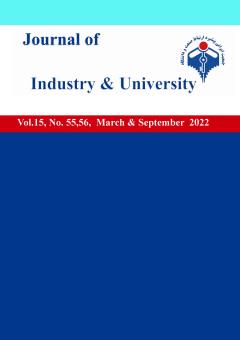Investigating the Sociological Causes of the Tendency to Use Mobile Social Networks
Subject Areas : General
Saeed Mohammadi Sadegh
1
![]() ,
hossein ebrahim
2
,
hossein ebrahim
2
![]()
1 - Assistant Professor, Department of Social Sciences, University of Sistan and Baluchestan, Zahedan, Iran
2 - Associate Professor, Department of Social Sciences, University of Sistan and Baluchestan, Zahedan, Iran
Keywords: Mobile social networks, Social factors, Family relationships, Interpersonal relationships,
Abstract :
Social networks have a significant impact on the collective and individual lives of people, and the amount and scope of their use increases every day. Social factors are among the most decisive factors in the field of using these types of networks. Therefore, in this research, an attempt has been made to study the effect of these types of factors including family, friends, relatives, ethnicity, media and social base on the use of social networks and its effect on the interpersonal and family relationships of Zahedan youth. The method of this research is the survey and the method of gathering information using a structured interview-based questionnaire tool, and the sample size is 300 people. In order to extract the data of this research from spss software and to analyze the data from the statistical tests of analysis of variance, the correlation coefficient was used for the intensity of the link between the variables along with the significance level of the test (sig). This research aims to answer the questions of how much the youth of Zahedan use mobile social networks? And what are the social factors affecting the use of these mobile social networks by the youth of Zahedan. The results of this research showed that: 49% of respondents use mobile social networks. Social factors such as: interpersonal relationships, family and family relationships, etc. can predict a total of 88.2% of the variance of the dependent variable, i.e. the use of mobile social networks
1. اخوان کاظمی، بهرام (1383)، درآمدی برکارآمدی در نظام سیاسی، تهران، نشر دانش و اندیشه معاصر.
2. انصاری، محمد مهدی (1386)، نخبه پروری سیاسی، تهران، نشر دادگستر.
3. آشوری، داریوش (1381). تعریفها و مفهوم فرهنگ، تهران، نشر آگاه.
4. بابایی، حبیب الله (1393). کاوشهای نظری در الهیات و تمدن، قم، پژوهشگاه علوم و فرهنگ اسلامی.
5. توین بی، آرنولد (1389)، بررسی تاریخ تمدن، ترجمه محمد حسین آریا، تهران، نشر امیرکبیر.
6. جان احمدی، فاطمه (1388). تاریخ فرهنگ و تمدن اسلامی، قم، نشر معارف.
7. جعفری، محمد تقی (1389)، حکمت اصول سیاسی اسلام، تهران، مؤسسه تدوین و نشر آثار علامه جعفری.
8. جمعی از نویسندگان (1398)، چیستی تمدن، ترجمة سید محمد حسین صالحی، قم، پژوهشگاه علوم و فرهنگ اسلامی.
9. خامنه ای، آیت الله سید علی، بیانات مقام معظم رهبری، http://farsi.khamenei.ir
10. راسل، برتراند (1371) قدرت، ترجمه نجف دریابندری، تهران، انتشارات خوارزمی.
11. رشیدی، علی (1386)، شایستهسالاری از کنفوسیوس و بودا و ارسطو تا آزمون شایستگی تحصیلی، اطلاعات سیاسی و اقتصادی، ش 220 – 219 .
12. رویمر، جان، ای (1381)، برابری فرصت، ترجمه محمد خضری، تهران، پژوهشکده مطالعات راهبردی.
13. سحمرانی، اسعد (1389)، اندیشمند مصلح، ترجمه دکتر صادق آئینه وند، تهران، دفتر نشر فرهنگ اسلامی.
14. شریعتی، علی (1394)، تاریخ تمدن (جلد 1)، تهران، انتشارات قلم.
15. شمس الدین، محمد هادی (1374)، نظام الحکم و الاداره فی الاسلام، بیروت.
16. عمید، حسن (1376)، فرهنگ فارسی عمید، تهران، انتشارات امیرکبیر.
17. غلامی، رضا (1401)، جستارهایی در باب تمدن نوین اسلامی، تهران، مؤسسه مطالعات فرهنگی و اجتماعی.
18. قانع عزآبادی، احمد علی (1371)، علل انحطاط تمدنها از دیدگاه قرآن، تهران، سازمان تبلیغات اسلامی.
19. کرمی فقهی، محمد تقی و دیگران (1386)، جستاری نظری در باب تمدن، قم، انتشارات پژوهشگاه علوم و فرهنگ اسلامی.
20. کلینی، محمد بن یعقوب (1360)، اصول کافی، تهران، انتشارات مکتبه الاسلامیه.
21. لوکاچ، هنری (1394)، تاریخ تمدن (جلد 1)، ترجمه عبدالحسین آذرنگ، تهران، نشر آذرنگ.
22. نصیری، محمد (فروردین و اردیبهشت 1387). اقتراحی در باب تاریخ و تمدن اسلامی، مجله معارف، شماره 55، 5 – 17 .
23. هابز، توماس (1380)، لویاتان، ترجمه حسین بشیریه، تهران، نشر نی.
24. هانتینگتون، ساموئل (1375)، سامان سیاسی در جوامع دستخوش تغییر، ترجمه محسن ثلاثی، تهران، نشر علم.
25- Campbell, Tom (1990), Tustice, Humanites Press International, INC.
26- Young, Micheal (1994) The rise of The Meritocracy, Publisher Penguin, Transaction Publishers.
27- Clarke, V. & Braun, V. (2013) Teaching Thematic analysis: Overcoming Challenges and Developing Strategies for effective Learning. The Psychologist, 26 (2), 120- 123.
28- Braun, V. and Clarke V. (2006), Using Thematic Analysis in Psychology, Qualitative Research in Psychology, 3, 77- 101.
29- Arrow, Kenneth (1994), Meritocracy and Economic Inequality, University of Chicago Press.
30- The Fontana (1988), Dictionary of Modern Thinking.


